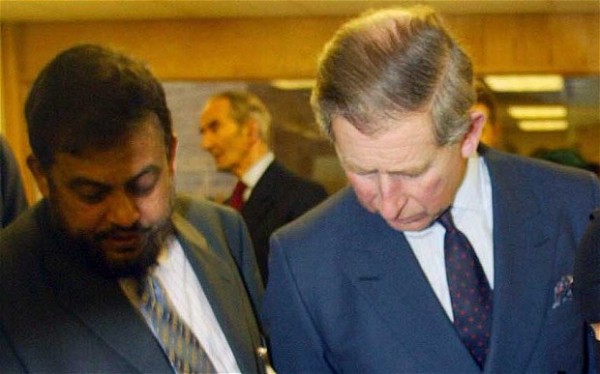
Chowdhury Mueen-Uddin with the Prince of Wales

By: Agence France-Presse
Source: http://www.globalpost.com
A Bangladesh war crimes court Monday ordered a British-based Muslim leader and a US citizen to be tried in absentia for the murder of 19 intellectuals during the 1971 independence war, prosecutors said.
The country’s much criticized International Crimes Tribunal (ICT) charged Chowdhury Mueen-Uddin and Ashrafuzzaman Khan with 11 “crimes against humanity” counts including murder, confinement, abduction and torture.
“They have been charged with the murder of 19 top intellectuals during the war. They included writers, university professors, doctors and journalists,” senior prosecutor Ziad Al Malum told AFP, adding both face the death penalty if convicted.
Rana Dasgupta, another prosecutor, told AFP that the court “has fixed July 15 for the opening statement” in their trial.
Some of the intellectuals the two men are accused of murdering, Malum said, are Sirajuddin Hossain, the executive editor of the Ittefaq daily newspaper; top playwright and Dhaka University professor Muneer Chowdhury; and the popular novelist Shahidullah Kaiser.
Both Mueen-Uddin and Khan were born in what was then East Pakistan before the nine-month war of independence against West Pakistan that ended in December 1971. They fled the country after Bangladesh successfully proclaimed its independence.
“Mueen-Uddin is living in Britain and Khan in the United States. The court has ordered the trial to be held in absentia and has provided defence lawyers for them,” Malum said, adding the court was not seeking their extradition.
“It’s up to the British people and their government whether they are going to extradite a top war crime accused or not,” he said.
Mueen-Uddin, 64, has held positions in a host of top Islamic organisations in his adopted homeland of Britain and was involved in setting up the Muslim Council of Britain – the largest umbrella group in the UK representing Muslims.
The London-based former journalist, who denies any wrongdoing, was a newspaper reporter in the impoverished South Asian country when the war of independence broke out.
He is accused of being a leading member of the notorious Al-Badr militia and of the fundamentalist Jamaat-e-Islami political party, which opposed the country’s break-away from Pakistan.
Mueen-Uddin would face the death penalty if convicted and extradited – although historically Britain has always refused extradition requests if the charges carry a death sentence.
Last week he told the BBC that he did not have confidence in the tribunal.
“I am happy to respond to these charges in an open and fair court of law that is recognised by the international community,” he said. “But I have little faith that the current process in Bangladesh is open nor just.”
Khan, a United States citizen, was a Dhaka University student leader during the war and who is now believed to be living in New York. Prosecutors described him as the “chief executor” for the Al-Badr militia. He has yet to make any public statement on the allegations.
The tribunal has already charged 12 people with war crimes. Four Islamists have been sentenced, three of whom have been handed down death sentences by hanging, including the vice-president of Jamaat-e-Islami.
Deadly protests over the trials have gripped the impoverished Muslim-majority country since January, when the court started handing out verdicts.
Bangladesh has struggled to come to terms with its violent birth.
The current government says up to three million people were killed in the war, many murdered by locals who collaborated with Pakistani forces.
Prime Minister Sheikh Hasina’s government established the ICT in 2010 to try the collaborators, but it has been hit by a series of controversies. Human Rights Watch has said the tribunal’s procedures fall short of international standards.



